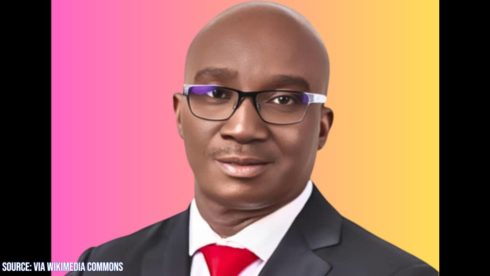FCT Minister Nyesom Wike issued a stern warning about the city’s rising population of beggars. The former Rivers State governor announced that starting Monday, law enforcement would begin apprehending beggars in the area. Nyesom Wike’s remarks have stirred debate, drawing responses from the affected population who insist they are in this situation by necessity, not choice.
One beggar in Abuja, speaking anonymously, expressed that the act of begging is far from a preference, sharing his deep discomfort with the discrimination they face daily. He conveyed the emotional toll of being perceived as an outcast, particularly in Nigeria’s capital. The beggar’s sentiments highlight the complex socio-economic issues fueling begging, as many struggle with unemployment, disabilities, and limited access to welfare support.
Nyesom Wike’s Proposed Crackdown Sparks Anxiety Among Vulnerable Populations
Nyesom Wike’s proposed crackdown on beggars in the Federal Capital Territory has raised significant concerns among Abuja’s impoverished and disabled residents. The minister’s initiative, aimed at reducing the visibility of beggars, is part of a larger plan to “clean up” the capital. However, for those affected, this move is a direct threat to their daily survival. Many fear that being driven off the streets will further worsen their plight in an already challenging economic environment.
Individuals reliant on begging say they have few alternatives, pointing to limited support systems and the harsh realities of poverty. While Nyesom Wike’s intentions may be geared toward enhancing the capital’s image, critics argue that this approach fails to address the root causes of begging. Advocates for the vulnerable emphasize the need for sustainable interventions, such as skill acquisition programs, that could empower beggars to earn a living independently.
“We Depend on Alms to Survive,” Say Abuja Beggars Amid Economic Hardships
The Abuja beggars, many of whom are physically disabled or face other challenges, explain that their reliance on alms is a result of extreme necessity. In interviews, several individuals expressed that the financial support they receive through begging is their sole means of survival in a tough economic landscape. “With the current economy, where people are suffering and there’s no food, my family and I will have to stay at home and wait for death because there will be nothing to live on,” one beggar shared.
The recent economic downturn has had a severe impact on low-income Nigerians, including those who turn to begging as a last resort. Rising inflation, high unemployment, and food insecurity have worsened the living conditions for many, leaving them without reliable income sources. As Abuja’s beggars struggle with these circumstances, they appeal to the government to consider their plight before taking action against them.
Discrimination and Social Stigmatization: The Daily Struggles of Abuja’s Beggars
Many beggars in Abuja face not only economic difficulties but also societal discrimination and social stigmatization. According to one blind beggar, public reactions toward them often involve fear or discomfort, with people avoiding sitting near them on public transportation or even crossing the street to avoid contact. “Some people see us coming and run away. In public vehicles, nobody wants to sit close to us,” he said, revealing the isolating effects of these reactions.
This stigma compounds the challenges that Abuja’s beggars already face, reinforcing feelings of marginalization. Advocates argue that Nigerian society must work to break down these prejudices, which prevent beggars from fully integrating into society. For those who feel isolated, acknowledgment and respect from others would go a long way toward restoring their dignity.
Calls for Empowerment: Abuja Beggars Seek Skills Training Over Punishment
Rather than being targeted for arrests, many beggars are appealing for government support to help them develop skills that could lead to sustainable employment. A visually impaired beggar in Abuja mentioned his ability to knit and expressed a desire for empowerment rather than punishment. “I can knit very well, forget that I am blind. The government should empower us instead of arresting and detaining us,” he said, stressing that many among them have skills but lack the means to utilize them.
This sentiment resonates with the broader call from activists advocating for poverty alleviation through skills training and financial support. Programs designed to equip Abuja’s beggars with marketable skills could pave the way for self-sufficiency, ultimately reducing the need for begging. Such initiatives, they argue, would not only restore dignity to these individuals but also foster greater social harmony in the capital.
A Complex Issue: Experts Weigh in on Sustainable Solutions for Begging in Abuja
Experts and social commentators argue that while efforts to reduce begging are understandable, they should be accompanied by meaningful social support measures. Nyesom Wike’s crackdown on beggars may have the potential to reduce visible poverty in the capital, but analysts caution that without addressing the underlying causes, this approach could merely displace the problem. Addressing the root issues—such as unemployment, disability, and lack of education—could lead to a more sustainable resolution.
To create a more inclusive city, social welfare advocates suggest implementing programs that focus on rehabilitation, job creation, and skills acquisition. By supporting beggars through these measures, the government could facilitate long-term change that benefits both the individuals and society at large. This approach, they assert, would align with Abuja’s goals of development and cleanliness while preserving the dignity and well-being of its most vulnerable citizens.
Table of Contents
Discover more from OGM News NG
Subscribe to get the latest posts sent to your email.














